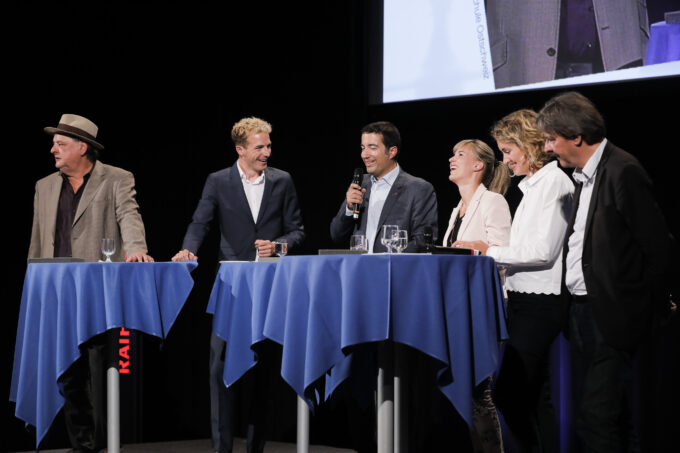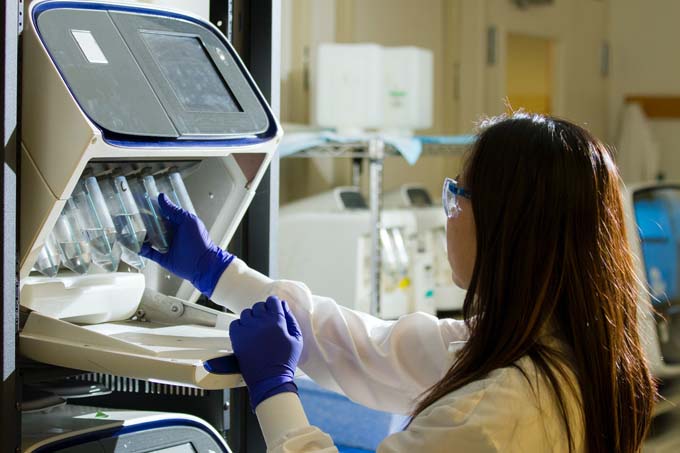From Kings at the "Networking Day" of the University of Applied Sciences St. Gallen
At this year's Networking Day at the University of Applied Sciences St.Gallen, Swiss democracy was put to the test. Yesterday, top-class speakers and a humorous moderator provided an entertaining Friday afternoon with interesting insights from politics, business and the media.

The 14th Networking Day 2018 of the University of Applied Sciences St. Gallen packed the visitors and the attendees. Under the motto "The Good King. Democracy on trial", top-class speakers discussed current topics such as the dwindling interest in democracy, xenophobia and other currents. With these and other questions, Sebastian Wörwag, Rector of the University of Applied Sciences St.Gallen, opened the 14th Networking Day on Friday, 7 September, at the Olma Messen St.Gallen.
Democracy - written in female
Wörwag invited the approximately 650 participants to reflect on democracy and the values that are needed for a functioning coexistence. Sure, it could have been called 'the good queen'," said Sigmar Willi, head of the FHS Alumni. But the quote comes from Plato - and a gender-appropriate spelling was not an issue 2500 years ago. The event was moderated by comedian and political blogger Michael Elsener, who with his sharp tongue and a good dose of humour kept the audience and the stage laughing.
The panelists did not see democracy in the black at all. On the contrary. "Democracy is becoming more alive," said Andrea Caroni. Thanks to e-collecting and e-voting, people will once again participate more in political discourse in the future. Endo Anaconda believes that "civil society will give the parties a run for their money", and that is a good thing. Paul Rechsteiner hopes that in future everyone, no matter where they come from, will have the chance of political education. Political activist and co-president of Operation Libero, Flavia Kleiner, wishes for the democracy of the future: "Cold times for naked despots."
"Democracy is becoming more vibrant"
One of the highlights was the political panel, which featured top-class speakers such as FDP Council of States member Andrea Caroni, SP Council of States member Paul Rechsteiner, SVP National Council member Diana Gutjahr, political activist Flavia Kleiner and musician Endo Anaconda. Caroni and Gutjahr had stood in for Petra Gössi (President of the FDP Switzerland) and Roland Rino Büchel (SVP National Councillor), who had to cancel their participation at short notice. The discussion focused, among other things, on how to regain citizens' trust in politics and increase their participation in democracy.
Democracy yesterday, today and tomorrow
Historian Daniele Ganser spoke about the history of Swiss democracy and how political power was "fragmented" by the introduction of the magic formula. He praised dialogue, "even with controversial views, one should engage in discourse", and criticized Switzerland's cooperation with "Partnership for Peace (PfP)", NATO's "kindergarten", as Ganser called the alliance.
PfP is an international structure imposed by the US to bring hesitant countries into line with NATO, Ganser said. Anyone who cooperates with them can no longer be called neutral.
Democracy with artificial intelligence?
Nicola Forster, founder and president of the think tank "foraus", ventured a look into the future. In his presentation, he showed how democracy can function in the age of total digitalization. In doing so, the young visionary pleaded for a participatory democracy instead of a voting democracy. "With artificial intelligence, for example, state services can be tailored even more closely to each individual," Forster said. "But Switzerland is not there yet." It is important, however, that "we have these competencies ourselves and do not leave them to others."
Democracy and the crisis of the media
The media play an important role in a functioning democracy. They are often referred to as the "fourth estate". But the media is in the midst of a deep transformation process, and the media landscape is shrinking. "It's going in a direction that
we don't like," says Daniel Binswanger, co-head of features at the online magazine Republik, who took over the role of "champion of independent media" from Christof Moser. "Funds are being diverted from the media and put into other areas. This is bad for society and bad for democracy."
Marc Walder, CEO and co-owner of Ringier AG, saw things somewhat differently: "Media have to diversify to have a future." He is certain that "those media that today depend on journalism for more than 70 percent will have a hard time in ten years' time".
"There is a need for civic education, where critical thinking is encouraged and an attitude is developed," finally said Flavia Kleiner. The speaker Diana Gutjahr is also in favour of political education, only that the discussions should not take place in school, but "at home at the kitchen table". However, it is the task of politicians, and certainly also of the media, to motivate people to vote - "and to do so in conversations and not by means of Facebook posts," said the National Councillor from Thurgau.









